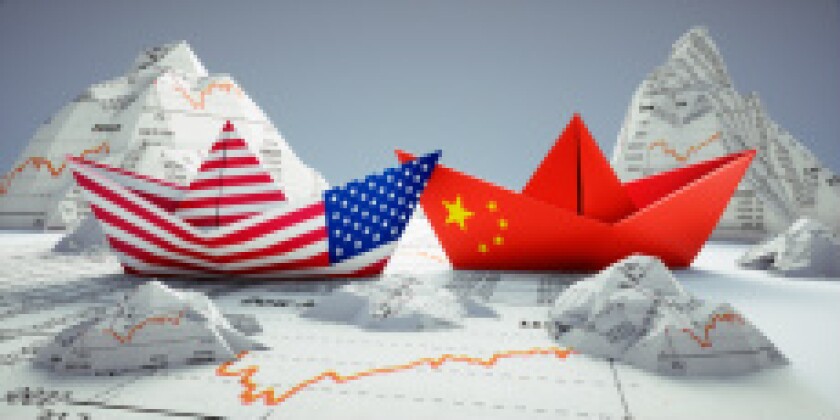Trade war negotiations between the US and China remain on track, despite numerous contradicting statements coming from US president Donald Trump this week.
It started on Tuesday, when Trump told reporters in London that a trade agreement with China might have to wait until after the next US presidential election in November 2020. “In some ways, I like the idea of waiting until after the election for the China deal,” he said. “But they want to make a deal now, and we’ll see whether or not the deal’s going to be right; it’s got to be right.”
Should there be no phase-one trade deal signed by December 15, the 15% additional tariffs on the remaining Chinese goods, including mobile phones and laptop computers, will kick in on that day.
The S&P 500 Index and the Hang Seng Index each fell by 1%, while the Nikkei tumbled by 1.2%, on Wednesday.
Tensions between the US and China also soared after the US House of Representatives voted 406-1 to pass the Uighur Human Rights bill. The bill would, if enacted, sanction Chinese officials over human rights abuses in the Xinjiang province. The bill will now go to the Senate, and if passed, to Trump.
“If the US takes actions to hurt China’s interests, it will pay the due price,” Chinese foreign ministry spokeswoman Hua Chunying said during a Wednesday press conference.
“I do not know how everybody sees those US senators,” she added. “I heard many US senators do not even have passports or come to China before, not to mention visiting Xinjiang. How can they represent the 1.4bn Chinese people or the 25m Xinjiang people?”
But things calmed down again mid this week, when Bloomberg reported that Trump’s comments around a deal delay should not be understood to mean that the trade talks were stalling, citing people familiar with the talks. The report added that US negotiators are still expecting a phase-one deal to be completed before December 15.
Trump himself assured the market on Wednesday that the trade talks with China were going “very well” when speaking once again to reporters in London.
On Thursday, China also offered its own reassurance. Gao Feng, a spokesperson of the Ministry of Commerce, said the talks are “on track”.
*
Huawei Technologies sued the US Federal Communications Commission on Thursday, asking the court to overturn an order passed by the FCC in November. The order bans carriers in rural US from tapping the Universal Service Fund to purchase Huawei equipment.
The telecom giant accused the FCC of failing to offer the required "due process protections" by labelling Huawei as a national security threat, according to an official statement.
In separate news, the domestic positive rhetoric surrounding Huawei took a sharp turn this week after a former employee, Li Hongyuan, spoke up about his experience dealing with the company over severance fees.
Li reportedly left the company in January 2018 and got into a spat with the company over his Rmb300,000 ($42,564) severance payment. Li sued Huawei in November 2018. One month later, he was detained for “leaking commercial secrets”.
Li was charged with extortion and spent 251 days in jail while the investigations were going on. In August, he was released without any charges. Li only shared his story last week after receiving $15,000 in compensation from the Chinese government.
*
The People’s Bank of China signed a bilateral local currency swap agreement with the Monetary Authority of Macao on Thursday. The size of the swap facility is Rmb30bn, or Mop35bn, and the term is valid for three years, the central bank announced.
*
The Caixin manufacturing Purchasing Managers’ Index (PMI), which focuses more on small and medium-sized enterprises, edged up slightly in November. The index grew to 51.8% in November from 51.7% in October. The increase was in line with the official PMI released by the National Bureau of Statistics, which surprisingly rose by 0.9 percentage point last month.
The Caixin manufacturing PMI’s increase was mainly driven by a jump in the employment sub-index from 48.2% to 50.1% in November. By contrast, new orders and output sub-indices fell from 53.6% and 53% to 52.8% and 52.9% respectively.
Despite the slight increase in both indices, analysts remain cautious.
“We do not think such a rise suggests a bottoming out of the economy, as strong growth headwinds remain, especially from the cooling property sector and China’s worsening fiscal situation,” Ting Lu, chief China economist at Nomura, wrote in a Monday note. “We expect hard data – including growth of industrial production, exports and fixed asset investment – to moderate in November.”
The Caixin services PMI also rebounded in November, climbing from 51.1% in October to 53.5% in November.
*
After Trump signed the Hong Kong Human Rights Act into law last week, which requires the US Department of State to conduct an annual review of the SAR’s political status to determine whether it still merits a special trade status with the US, China has struck back.
The Chinese foreign ministry’s Hua said in a press conference on Monday that China will sanction three US NGOs — the National Endowment for Democracy, Human Rights Watch and Freedom House.
Hua did not specify exactly what kind of sanctions these NGOs will have. China will also temporarily suspend visits to the Hong Kong port by US navy ships.
*
Average daily trading volume in Chinese bonds rose 113.3% year-on-year on Tradeweb’s platform in November, according to a monthly activity report published on Thursday.

